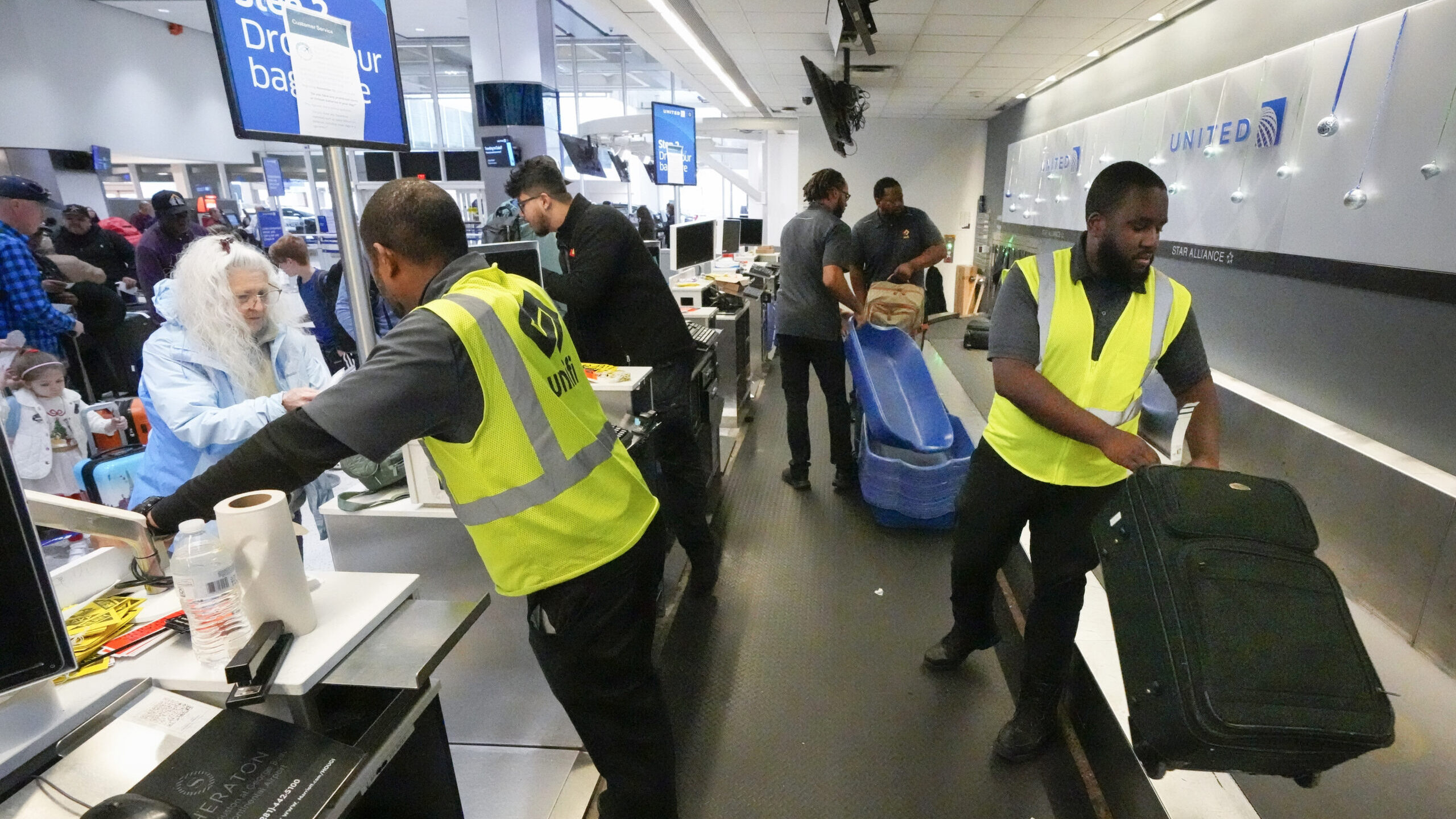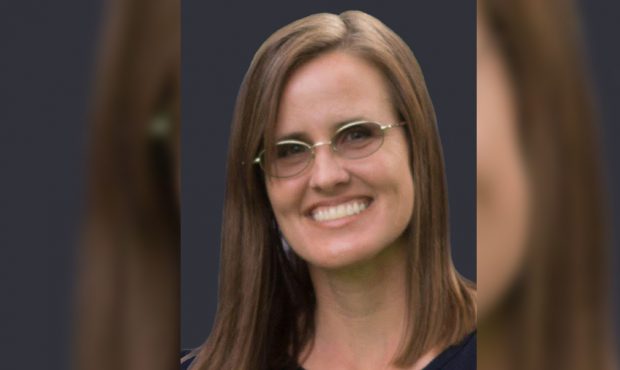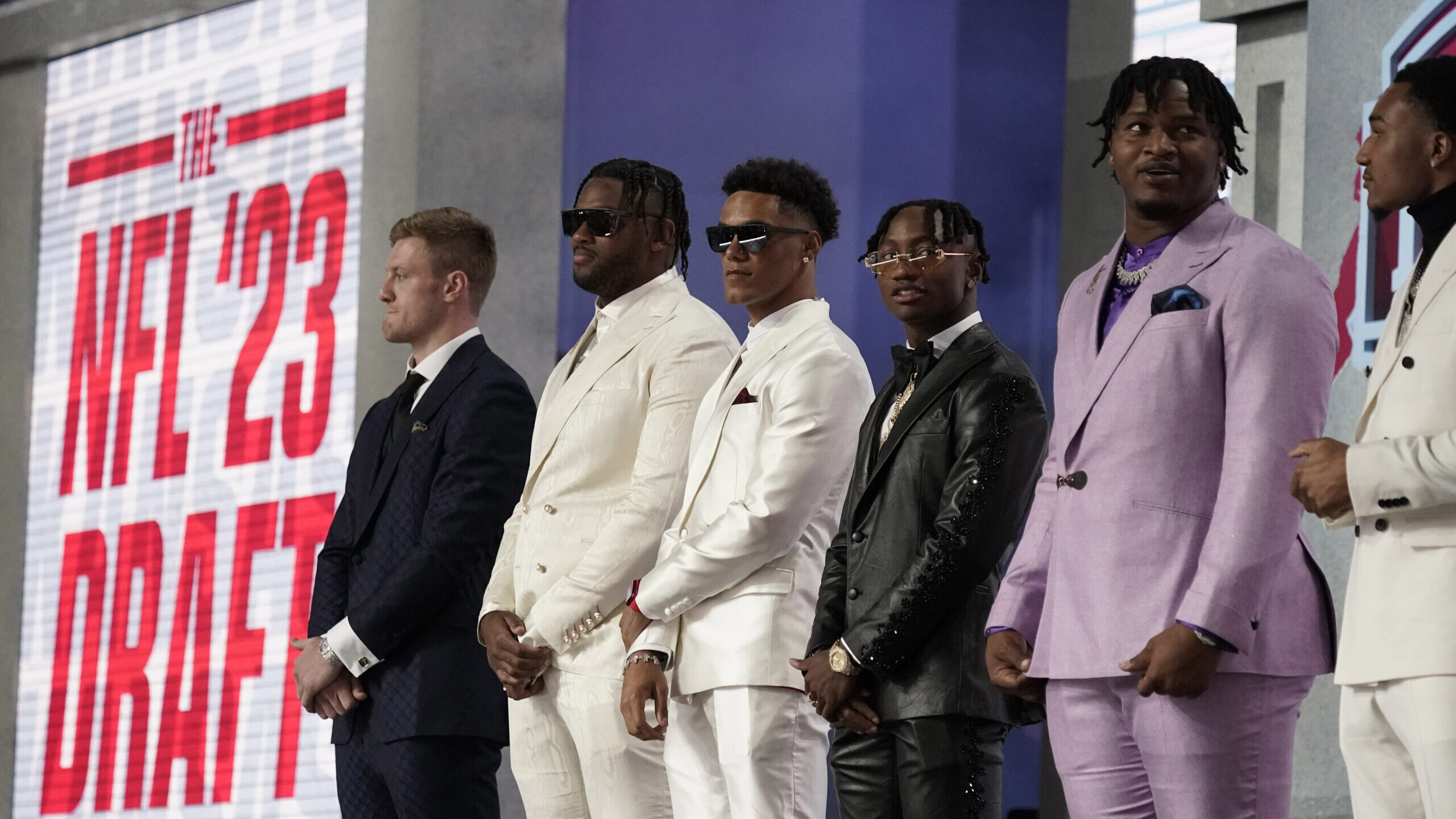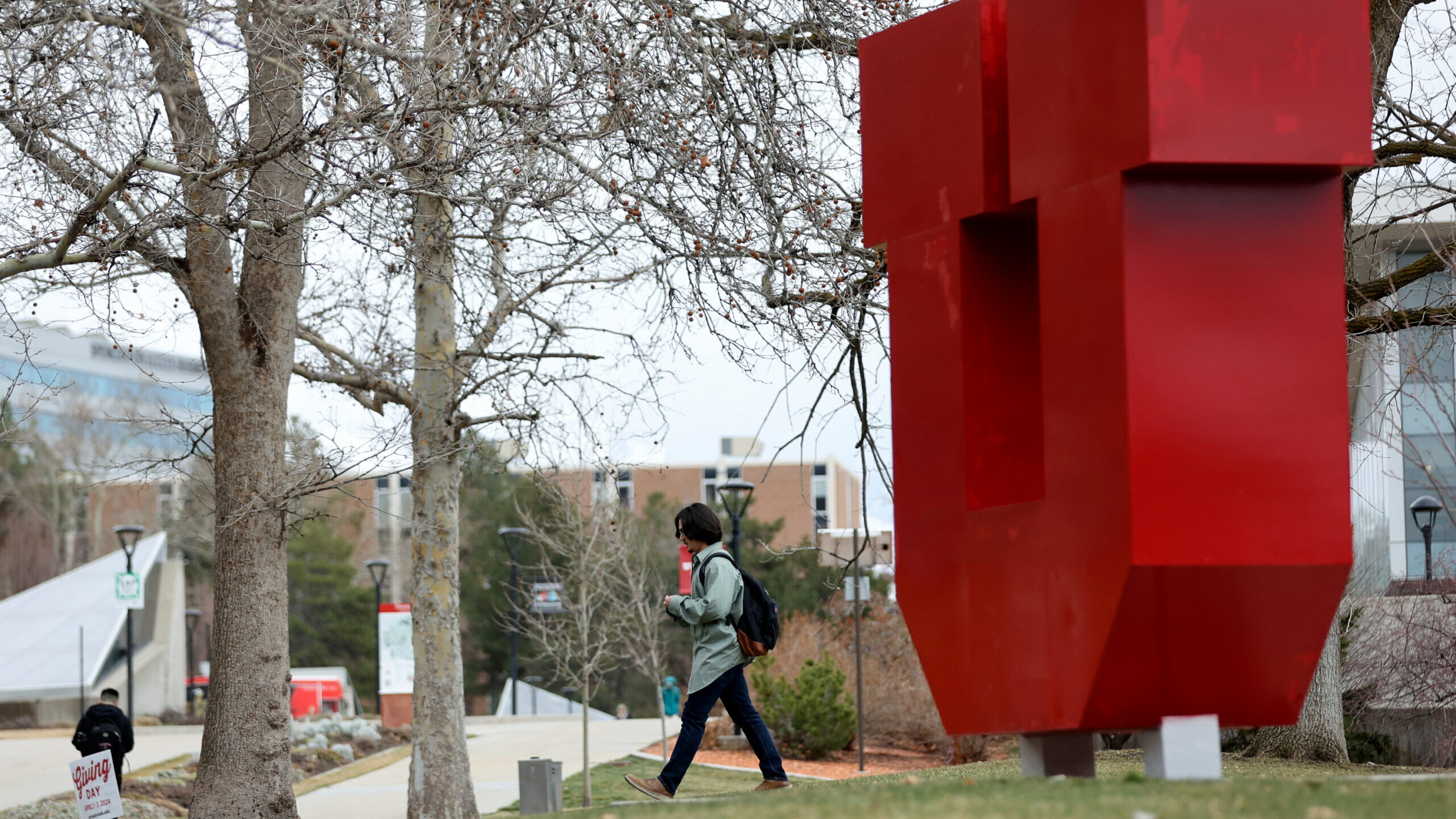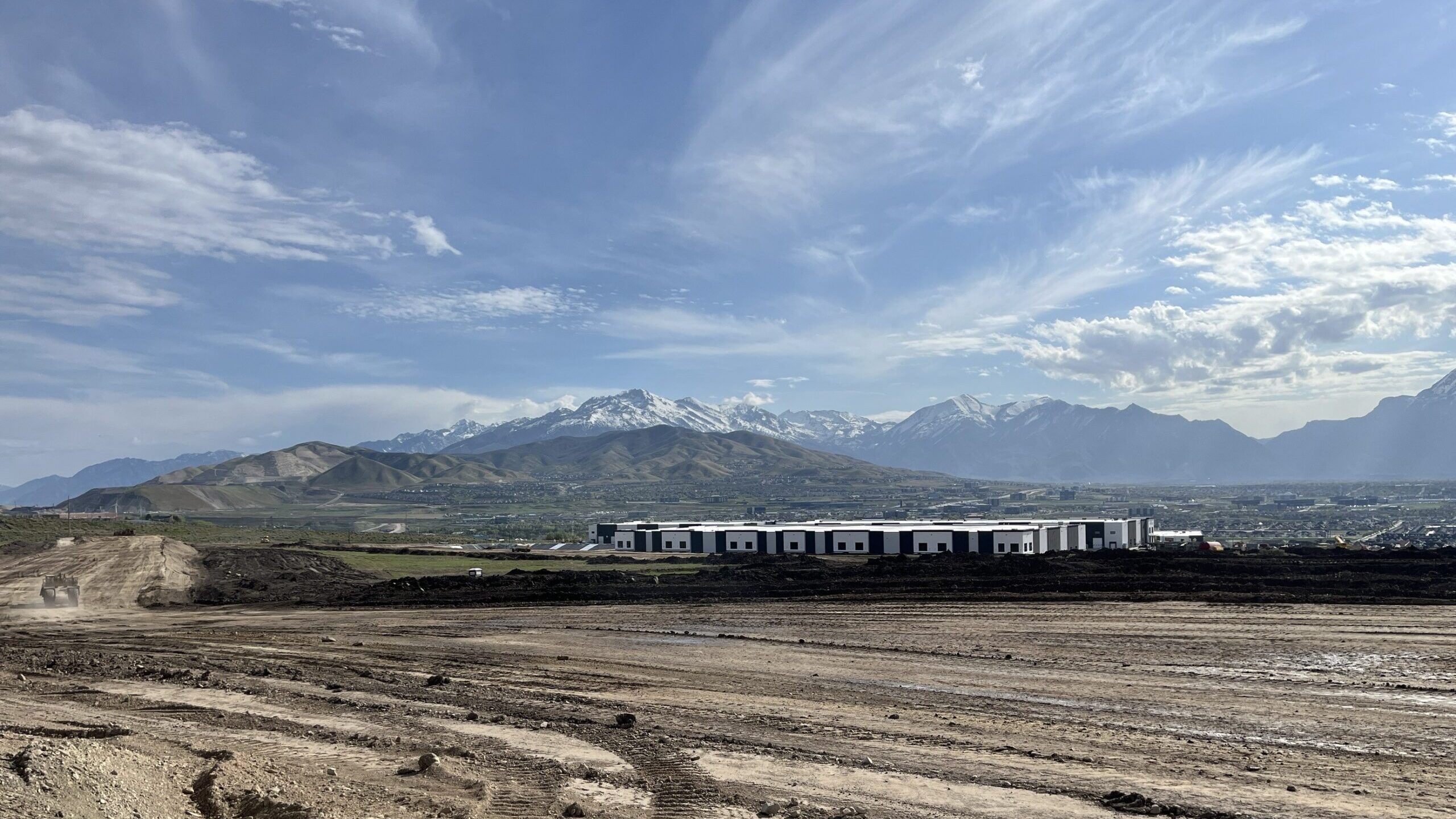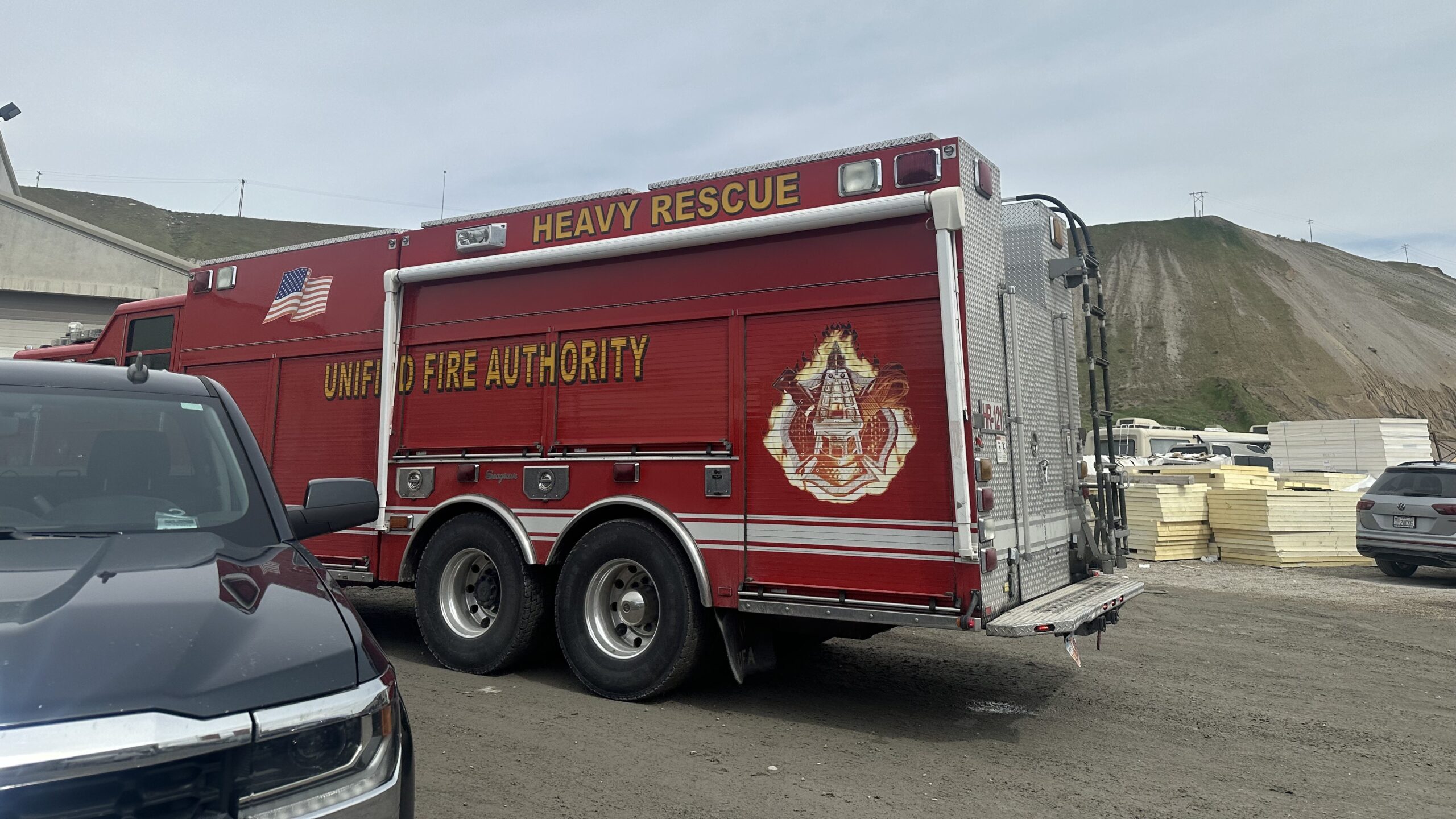Hope In Darkness – Ep. 5 – Full Transcript
Sep 9, 2020, 9:35 AM | Updated: Jun 16, 2022, 2:52 pm
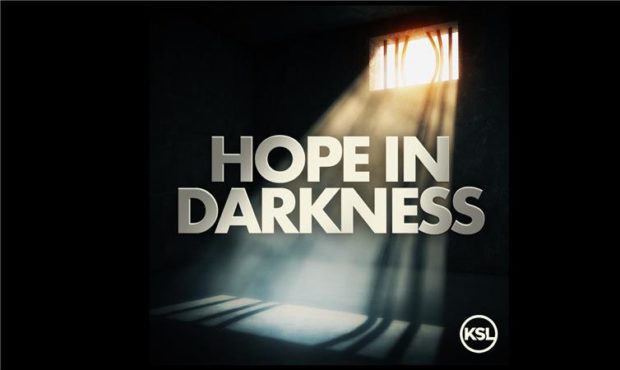
Full Transcript – Ep. 5: El Helicoide
We take a closer look at El Helicoide itself and how it serves as a metaphor for the chaos in Venezuela. The first of several health crises to strike Josh Holt leaves him struggling, helpless and alone. A fellow inmate offers more context and perspective.
Listen: Apple Podcasts, Stitcher, Spotify, & more.
On social: @HopeDarknessPod Facebook, Twitter, Instagram
Ep. 5: El Helicoide
BECKY BRUCE:
Hope in Darkness is a podcast that addresses sensitive topics including torture, abuse, and human rights violations. Listener discretion is advised.
When Josh and Thamy first returned to El Helicoide after their July 4th court appearance, they were met by a guard called Carrot.
JOSH HOLT:
Zanahoria. She had really, really bright red hair. That’s why they call her zanahoria, carrot. My wife said, you know, “I’m really worried about him. Are you guys gonna be able to take care of him?” And she says, “Don’t you worry about it. We’ll take care of him.”
BECKY:
There was just one other person in the room — a man with a briefcase full of tools, apparently working on a broken fan.
JOSH:
We were under the conception that he was an actual guard. He was just part of the prison crew. He had a phone. He was texting right there in front of the guard.
BECKY:
But when Carrot left the room, and they started chatting with the maintenance guy, they realized he wasn’t part of SEBIN.
JOSH:
He was a political prisoner. He was just out and about, and he was fixing things. We were like, wait a second. You’re telling us that you’re a prisoner here in this prison? He goes, yeah. We were just shocked by that. I was just thinking, there’s no way. What kind of prison is this?
BECKY:
I’m Becky Bruce, and this is Hope in Darkness, Episode Five, “El Helicoide.” In this episode, we’ll tell you about the iconic and now notorious building that became Josh and Thamy’s home for nearly two years. El Helicoide, carved in interlocking coils into a hillside, is more than a prison. It became a metaphor for the corruption and turmoil plaguing Venezuela as a whole. And to a certain extent, the disorder and confusion among the individual prisoners also reflected the country’s descent into chaos. This became Josh and Thamy’s new normal, and they had to figure out how to live there. We’ll be back after this.
[BREAK]
BECKY: El Helicoide looms large on the Caracas landscape. Picture a three-sided pyramid with rounded corners, topped with an aluminum geodesic dome you can see from pretty much anywhere in the city. From above, it looks a little like a fried egg, made out of metal and concrete. It’s a bizarre site made even more striking by its location, rising out of a poor neighborhood in Caracas. There’s nothing nearby that can touch its size or outlandish design.
But El Helicoide had its roots in Venezuela’s boom times in the 1950’s and 60’s. Originally built to be a first of its kind drive-in shopping mall, the road coils around the outside of the building, and the building itself hugs the hill on which it sits. The Roca Tarpeya, or Tarpeian Rock, so called after a site in ancient Rome where executions were carried out. As for the buildings name, El Helicoide, the helix, comes from the spiraling design. The would-be shopping mall was seen as a triumph of modern design, said to be inspired by Frank Lloyd Wright. The Museum of Modern Art in New York included a model of the building in its 1961 “Roads” Exhibition. Famed Chilean poet Pablo Neruda called it, “one of the most exquisite creations ever to have sprung from the mind of an architect.” When it was done, it would have been a shining example to the world of Venezuela’s economic success. But somewhere between the conception of El Helicoide in the 1950s and its expected debut as a mall, the original vision for the structure never materialized.
The modernist drive-in mall was the vision of President Marcos Perez Jimenez, a dictator, who wanted to show off Venezuela’s wealth and power. After a coup resulted in the removal of Perez Jimenez in 1958, there were accusations that the defunct leader and his government funded the developers. The new government refused to allow construction to continue. Lawsuits were filed. The concrete foundations sat quiet and empty for years. It sat forgotten as the city of Caracas grew around it. Then, government agencies started to move in, including Venezuela’s secret police, the SEBIN. By the 1990s, the intelligence agency made its home on the first few floors of the spiral, and that once forgotten place with its never-open shops became the perfect environment for the SEBIN to do things they wanted to keep hidden from the public.
DR. LAURA GAMBOA:
El Helicoide is where most political prisoners are kept.
BECKY:
Here again is Utah State University assistant professor Laura Gamboa.
GAMBOA:
I know that people who are kept there are more often than not subject to torture, isolation for months, or not being let to see the sun, or not being allowed to see their family members, or just a lot of secrecy.
BECKY:
She says that El Helicoide’s use as a prison for detractors of the Nicolas Maduro regime has significantly ramped up in the past five years. In 2014, the public first became aware of people being imprisoned at El Helicoide as street protests became more frequent. Now El Helicoide holds hundreds of people.
GAMBOA:
In many ways, El Helicoide, in my personal opinion, resembles some of the more iconic buildings that we have seen in these awful dictatorships of South America of the 1970s.
BECKY:
We told you in a previous episode about Augusto Pinochet, the general who took control of Chile from 1973 to 1990. Under his rule, the Chilean National Stadium was one of these places.
GAMBOA:
Where the-the dictatorship took several political prisoners, and nobody ever saw them ever again. This is so symbolic that still today, there’s an entire bench in the stadium that is kept open in memory of the people who died in the stadium. If you go to those places, some of them have been kept as museums for memory and truth and reconciliation, because literally they became a symbol of the dictatorship. Literally, people would go in there, and we would never know if or when they went out.
BECKY:
This was a real fear for many people living in Caracas under the Maduro regime. What few reports came out of El Helicoide from inmates and detainees detailed horrific abuses. Some described being forced to answer questions with bags of excrement over their heads. Others were waterboarded. You already know what happened to Thamy. This is the punishment for those who dare to challenge or even criticize Nicolas Maduro’s regime — people like Gabriel Valles.
GABRIEL VALLES:
[Skype music] Hi, I listen to you.
BECKY:
We talked to Valles over Skype from his current home in Colombia, where he lives as a Venezuelan refugee who fled the regime.
VALLES:
It’s the system there. The government act like gangsters.
BECKY:
Valles, Gabo to his friends, is a human rights activist who was taken into custody by the SEBIN back in 2014. Valles began protesting the government in 2007, when Hugo Chavez was still alive and still in power. He and his friend Lorent Saleh were student activists who fought the regime as part of their group called Operation Liberty. He’d had several scrapes with the law due to his anti-government activities. Before his arrest in 2014, he and Saleh were living in Colombia at the time, hoping to draw attention to Colombian guerillas allegedly working with the government of Nicolas Maduro. Saleh was arrested on September 4, 2014 and vanished from public view — to the distress of Gabo and his fellow activists. They suspected he’d been handed over to Maduro’s government. The next day, Gabo held a news conference.
VALLES:
I was talking. Talking about what happened with Lorent. We don’t know anythihg. They just take him to the government of Venezuela. And we can’t’ speak with him. We don’t know where they took him and all this stuff. When I was talking, I can see the police guy came to the corner in the street.
BECKY:
Gabo kept talking and finished his news conference. He went into the nearby mall with another Venezuelan friend.
VALLES:
When I was walking in the mall, I just see more cops, more cops. So, I don’t know what happened. I went to the supermarket inside the mall, and I see the cop, you know, enter the supermarket, and go into the hall.
BECKY:
They cornered Gabo in one of the aisles.
VALLES:
They say, “Well, you got to need …your papers. Oh, you know, everyone get your papers. And when they see mine, yeah, Gabriel Valles, you’ve got to come with us. They don’t tell me why. They just tell me you got to come with us.
BECKY:
Police showed Gabo a presidential order expelling him from Colombia. The Venezuelan Government later released a video purportedly showing Gabo and his friend Saleh discussing plans to bomb parts of the country.
NEWS ARCHIVAL:
El video de los venezolanos Lorent Gómez Saleh y Gabriel Valles planeando acciones desestabilizadoras…[fade down]
NEWS ARCHIVAL:
[fade in]…Rodriguez Torres released additional footage implicating Gómez Saleh and Gabriel Valles among others in the destabilization plans carried out against the government earlier this year. The latest videos…[fade down]
BECKY:
Similar to what was said of Josh. The regime saw them as terrorists, but they had no sense of that kind of accusation when they were arrested. Without any court hearing or a meeting before a judge, Gabo found himself headed to the Venezuelan border.
VALLES:
You cannot call your family, you cannot call lawyers. You’re delivered to the intelligence service, just like that.
BECKY:
To the SEBIN, in whose custody he would stay for the next four years. El Helicoide was only just starting to be used as a prison in 2014, but there were two other prisons where the SEBIN held opposition figures. Gabo and his friend initially found themselves in one of those facilities.
VALLES:
They take us to a basement in Caracas. They put us there, two year and two months.
BECKY:
The name of that place?
VALLES:
La Tumba.
BECKY:
The tomb.
VALLES:
It’s like the grave because there…was so cold. There’s no window. You don’t know when it was day, when it’s night.
BECKY:
Gabo spent most of that time in solitary confinement and in a state of sensory deprivation. The walls were painted stark white, and the lights stayed on 24 hours a day.
VALLES:
You got to see in your mind…like a laboratory.
BECKY:
Like a laboratory.
VALLES:
With all the light and the white walls, and the floor was black. It’s weird.
BECKY:
This would be exactly Josh Holt’s experience when he arrived at El Helicoide in 2016 after his interrogation ended, and he arrived in his new cell. A tiny room, isolated, with no ability to talk to the outside world. Lights on day and night. It was extremely disorienting and designed to break the prisoner. Around the same time Josh arrived at El Helicoide, Gabo and his friend Lorent staged a hunger strike and were transferred there from the tomb. They witnessed a number of human rights violations. Over time, El Helicoide didn’t just hold political prisoners, people like Gabo. Anyone could be held there for any reason. The SEBIN imprisoned hundreds of men and women, shoehorning them into spaces originally meant to be fashion boutiques. The spaces never meant to be jail cells filled up with dozens of prisoners per shop in some cases. ABC News correspondent Matt Gutman saw these conditions himself. He covered the unrest in Venezuela well before Josh Holt was arrested. In 2015, he reported on rioting and food shortages.
MATT GUTMAN:
On any given day, you’re likely to see lines snaking for blocks around stores in Venezuela. Goods like coffee, sugar, diapers, even toilet paper are being strictly rationed. Because of that the protests there have become more intense. Now, the Venezuelan government has authorized its police to use deadly force if they feel their lives are threatened.
BECKY:
Gutman found himself held at El Helicoide briefly in October 2016 — because he tried to film the conditions at a nearby hospital.
MATT GUTMAN:
I was actually just in one of the underground garages for a couple of hours. I’ve been held elsewhere for a longer period of time, a few days. But my impression of the intelligence branch agents — this is basically the Venezuelan secret police — is that they are used to getting everything they want. They are vetted by the Venezuelan government. They are paid better, they get better perks than anybody else, and they demand more.
BECKY:
That extended to their treatment of the political prisoners. Inmates who had money or other things the guards wanted could get special treatment or privileges, say access to cell phones, or freedom to move about the hallways. Common prisoners, those charged with run of the mill crimes like robbery or assault, didn’t get the same privileges. Though certainly they figured out ways to smuggle in what they wanted and hide it from the guards. It’s a strange world, where like the government outside the prison, quality of life could vary greatly, depending on who you knew — and how you paid them. Gabo said he knew he couldn’t let the SEBIN break him.
VALLES:
You just realize that there’s you and only you, and you’ve got to do it. And nobody can, but nobody can stay strong for you in that moment. Nobody. So, I chose that.
BECKY:
Josh and Gabo eventually became friends at El Helicoide. Like Gabo, Josh resolved to get himself through it. To stay strong. After all, what’s 45 days?
[BREAK]
BECKY:
Venezuela, as we’ve demonstrated, was in complete disarray. So was the prison. So were the lives of each prisoner. Because Josh was being held in the part of the prison with people accused of common – not political crimes – he had no privileges. There was no access to an attorney or outside exercise, and Josh would soon learn, no access to medical care. Days after Josh Holt found out he’d need to wait at least 45 days before his next chance at freedom — just over a week after his arrest — he felt an all too familiar pain in his back and side.
JOSH:
I had had a kidney stone when I was probably about 16, 17. I remember my parents running me to the ER, because they didn’t know what was going on. I didn’t know what’s going on. I just remember having this pain, and I was screaming and crying.
BECKY:
A kidney stone. No mistaking that feeling for anything else.
JOSH:
Just laying on the ground, in my underwear, sweating profusely, cockroaches crawling all over me. I was in just agonizing pain.
BECKY:
A kidney stone, in the best of circumstances, can be incredibly painful.
JOSH:
The pain that you feel, is just radiating throughout your body, especially in spots where you don’t want it to, and it’s just intense.
BECKY:
So long as the stone is small, most people can pass the stones on their own. But kidney stones can also be medical emergencies in their own right. A stone large enough to cause blockage requires surgery to remove. It can also create the perfect conditions for an infection. Prison wasn’t exactly the cleanest environment.
JOSH:
They’d give me a liter bottle of water, and that’s supposed to last me a couple days. The people that have had kidney stones, you know, you need medicine, you need something to open up those tubes, and you need to drink a lot of water. And so, with being dehydrated as it was, that doesn’t open anything up.
BECKY:
Josh screamed in pain. He yelled for a doctor. He didn’t get one.
JOSH:
And so, for the next probably week and a half, that’s what it was like. It was just fighting through the pain.
BECKY:
Eventually, he did pass the stone. He’s not sure exactly how long it took — because he couldn’t see the sun. I asked him how he handled the pain.
JOSH:
It wasn’t…that’s the thing…I mean, sometimes. A lot of people ask – how do you do this, or how do you do that? But when we go through things, how do we do it? We just do it because we know we have to. There’s no ifs, there’s no answers, no buts.
BECKY:
Josh learned an important lesson, though. He had to speak up in his own defense.
JOSH:
From that day forward I just started fighting more and more and more for things that I wanted, because they wouldn’t bring me medicine, and they wouldn’t let me go and bathe myself. And finally, the dean of the prison showed up one day, to check on me, I guess. So, when he opened the door, he looked at me, I looked up at him, and I said, “Can I go bathe myself now?”
BECKY:
This entire time, those first couple of weeks in prison, Josh had not been allowed to leave his cell. Nor did he have access to a bathroom or a sink. And what water he did have, he needed to drink. He was a little ripe.
JOSH:
He just mentioned to the guy that was there, he’s like, yeah, go clean him up.
BECKY:
The guard and the dean, or warden, left, but the guard came back and walked Josh up the hallway. El Helicoide is one giant curving triangular ramp inside. They stopped not too far away in front of another cell, where Josh was surprised to discover his wife. Thamy, unlike him, was not alone. She shared her cell with 32 other women, with two bathrooms to use between them.
JOSH:
She came up and she gave me two bottles of water.
THAMY HOLT:
I refill my Coca-Cola containers, and I give Josh two of these every day.
BECKY:
Basically, two two-liter bottles she had upcycled to collect the water. This method wasn’t ideal, but it’s what they had. Water didn’t flow all the time on demand from the taps in El Helicoide. Thamy collected the water in her two liters when she could, but if they used up what she had before the water came back on, too bad.
JOSH:
Sometimes water wouldn’t come for over a week, and everyone would be out of water. And so, the people in the prison themselves would have to pay for a water truck to come to the prison so that they could bring this big huge hose into the prison, and we tried to fill all of our stuff at the same time.
BECKY:
It also wasn’t the cleanest or safest. It came out of the tap brown and needed to settle before you could use it.
THAMY:
If you left the rest…the water, you can take on the top, and the top is clean.
BECKY:
If introduction to prison life was like being splashed with a bucket of cold water, finally getting to bathe — but having to do it with cold water — was yet another parallel to real life.
JOSH:
She was in a room with all these women, and so they were taken care of a little more than what the men are taken care of. They actually had an air conditioning in their room. Her water was right below the air conditioning. So, when she’d give me this water, it was literally like…
THAMY:
Cold water?
JOSH:
Yeah, it was like taking a bath with water that just came out of a refrigerator. I mean, it was, it was just two two-liter bottles of water, but still it was…
BECKY TO JOSH:
Was that good or bad?
JOSH:
I hated it.
BECKY:
The daily walks to Thamy’s cell, while indicative of all the things that were wrong with El Helicoide, also represented the end of Josh’s roughly two-week initiation into prison life.
JOSH:
At first, whenever some type of prisoner is brought to the jail, they haze them, they torture them. They do whatever they can to make their life a living hell, and that’s what they did to me. That’s what they did to everyone else. Once you get through that little haze period, they finally start giving you a little bit more of these human rights that you have.
BECKY:
Leaving the cell, even if it was just once a day, improved his standard of living.
JOSH:
And so, being able to walk to her cell with someone, and to get those bottles of water, just brightened my day.
BECKY:
It also gave him a way to reconnect with Thamy and learn about what was happening to her.
JOSH:
She would give me paper notes, and I would give her paper notes back.
BECKY:
Thamy figured out a way to hide the notes so only Josh could read them.
JOSH:
So, you know when you have a two liter bottle, you can take the air out and it kind of sinks in a little bit? She would tuck the paper note up into the wrapping of the two-liter bottle, of whatever soda pop it was, and then she would fill it up with water so would expand out and hold the note in there. I’d have the same note on me, and I would stuff my notes back up in there and blow the bottles out and put the lid on it, to hold it in there. Then I’ll put her note in my pocket.
BECKY:
Through this secret system, Josh learned about Thamy’s run-in with her cellmates, and her beating at their hands.
THAMY:
I changed my clock. So, when they was sleeping, I was wake up.
BECKY:
That schedule change made it easier for her to get water, because when the water did run, it ran at night. Josh learned that Thamy was having health issues of her own. A shoulder injury from before her arrest became aggravated. Sleeping on the floor did not help. Like Josh, her requests for medical attention, or just some Tylenol, went unanswered. Josh developed a cough that wouldn’t go away and complained about having a hard time breathing. The SEBIN didn’t do anything. Thamy and Josh would have many more health needs while locked up. None would be resolved before they left, nearly two years later. His trips to and from the bathroom passing by Thamy’s cell drew attention to Josh from the other inmates nearby — common prisoners.
JOSH:
There was probably 80 people being held in a cell. It wasn’t very big, it was…there were two rooms that were basically connected to together. That’s where about 80 people slept and there was no walking room in there. When I walked by there, I was looking think, wow, I can’t believe these people are being held like this.
BECKY:
And though he had been isolated from them, the other prisoners were well aware that an American was being held at El Helicoide.
JOSH:
It had been in the news. They had said all these bad things about me. They said that I had killed some person in April, when I’d never even arrived in Venezuela until June.
BECKY:
But they didn’t know exactly where he was. Now, because they had seen him walk past, they did. Word got back to the cell next door to his. The one that connected to his own cell through two small openings in the concrete wall near the ceiling.
JOSH:
That cell was full, probably about 30 people. I didn’t know that this was a cell because I could hear people talking in there. I could hear a TV. I could hear different things.
BECKY:
Just over two weeks after his arrival, he heard a voice saying —
JOSH:
“Hey, are you the gringo?”
BECKY:
Josh looked up and saw a pair of hands sticking through the opening. One of his next-door neighbors had stood on the shoulders of another man to talk to Josh.
JOSH:
Are you the gringo? Which basically means white guy. That’s what they called me. From that day forward for two years, my name was Gringo. He said “Hey, are you the gringo?” And I said, “Yeah.”
BECKY:
The conversation continued, but Josh struggled to understand between the tall thick walls and the prisoners hushed whispers. He never caught the other man’s name.
JOSH:
And so, I would kind of stand on this little tiny cement bench that they had in there. Then get enough up to where I can get my hand on to the window, and pull myself up for a couple seconds so I could see what was, who I was talking to. I can actually hear him.
BECKY:
Finally, Josh understood. His neighbor asked, “Do your parents know that you’re here?”
JOSH:
And I said, “No. They don’t know I’m here.” He said, “Would you like to call them?” I said, “Would I like to call them? Of course, I would like to call them. Hundred percent, yes!”
BECKY:
Next time on Hope in Darkness.
LAURIE HOLT (JOSH’S MOTHER) ARCHIVAL:
For us, it’s just continual bombs lowering all the time. Like, when are we going to get that day? That finally we get that good news.
BECKY:
Hope in Darkness is written and produced by me, Becky Bruce. Additional producing and editing came from Nina Earnest. Sound Mixing by Trent Sell. Our executive producer is Sheryl Worsley, original theme composed by Michael Bahnmiller. Additional voice work provided by Rebecca Cressman and Alex Kirry. Special thanks to Josh and Thamy Holt and their family for sharing their experiences and story. You can follow us on Twitter and Instagram at Hope Darkness pod or online at hopedarkness.com and your feedback is always helpful. Drop us a rating or review wherever you listen. Hope in Darkness is a KSL podcast.


